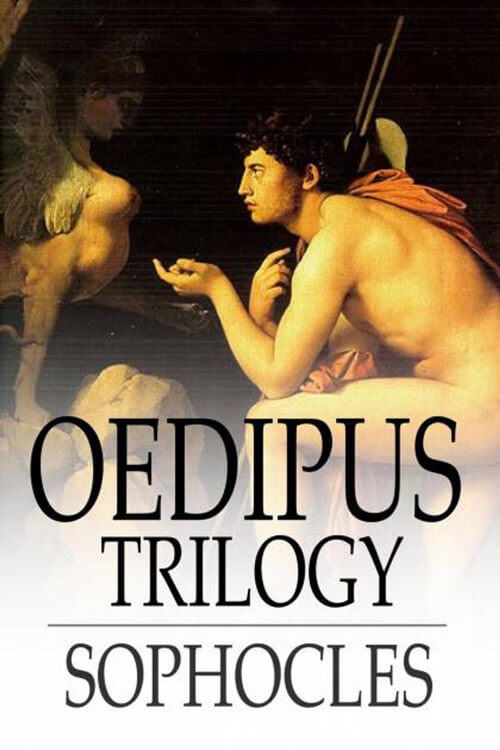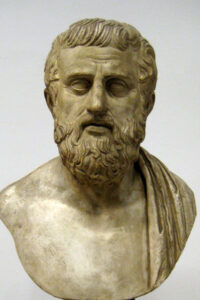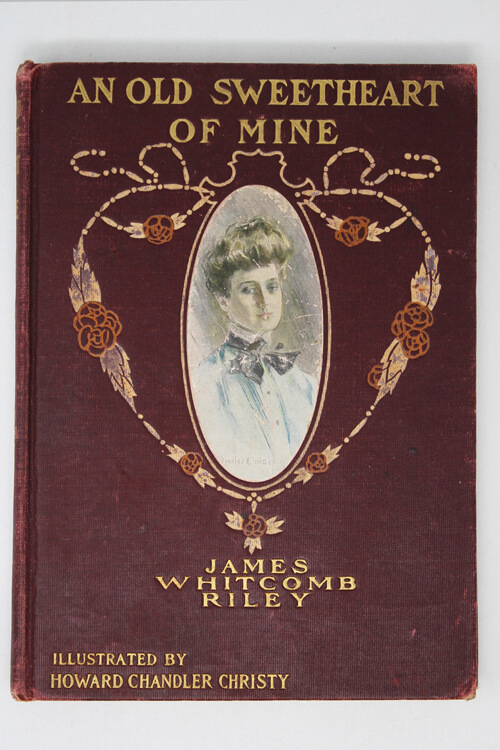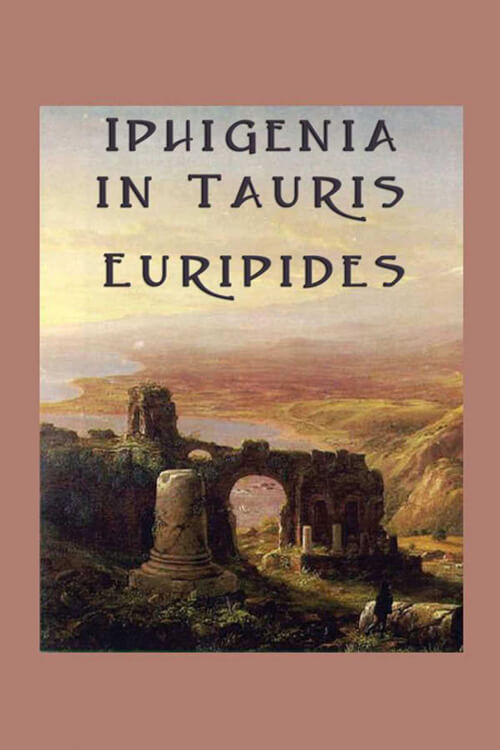
Sophocles’ Oedipus Trilogy
Thou seest how both extremes of age besiege Thy palace altars–fledglings hardly winged, and greybeards bowed with years; priests, as am I of Zeus, and these the flower of our youth. Meanwhile, the common folk, with wreathed boughs, Crowd our two market-places, or before Both shrines of Pallas congregate, or where Ismenus gives his oracles by fire. For, as thou seest thyself, our ship of State, Sore buffeted, can no more lift her head, Foundered beneath a weltering surge of blood. A blight is on our harvest in the ear, A blight upon the grazing flocks and herds, A blight on wives in travail; and withal Armed with his blazing torch the God of Plague Hath swooped upon our city emptying The house of Cadmus, and the murky realm Of Pluto is full fed with groans and tears. Therefore, O King, here at thy hearth we sit, I and these children; not as deeming thee A new divinity, but the first of men; First in the common accidents of life, And first in visitations of the Gods. Art thou, not he who coming to the town of Cadmus freed us from the tax we paid To the fell songstress? Nor hadst thou received Prompting from us or been by others schooled; No, by a god inspired (so all men deem, And testify) didst thou renew our life. And now, O Oedipus, our peerless king, All we thy votaries beseech thee, find Some succor, whether by a voice from heaven Whispered, or haply known by human wit. Tried counselors, methinks, are aptest found To furnish for the future pregnant rede. Upraise, O chief of men, upraise our State! Look to thy laurels! for thy zeal of yore Our country’s savior thou art justly hailed: O never may we thus record thy reign:– “He raised us only to cast us down.” Uplift us, build our city on a rock. Thy happy star ascendant brought us luck, O let it not decline! If thou wouldst rule This land, as now thou reignest, better sure To rule a peopled than a desert realm. Nor battlements nor galleys aught avail, If men to man and guards to guard them tail.
OEDIPUS Ah! My poor children, known, ah, known too well, The quest that brings you hither and your need. Ye sicken all, well wot I, yet my pain, How great soever yours, outtops it all. Your sorrow touches each man severally, Him and none other, but I grieve at once Both for the general and myself and you. Therefore ye rouse no sluggard from day-dreams. Many, my children, are the tears I’ve wept, And threaded many a maze of weary thought. Thus pondering one clue of hope I caught, And tracked it up; I have sent Menoeceus’ son, Creon, my consort’s brother, to inquire Of Pythian Phoebus at his Delphic shrine, How I might save the State by act or word. And now I reckon up the tale of days Since he set forth, and marvel how he fares. ‘Tis strange, this endless tarrying, passing strange. But when he comes, then I was base indeed, If I perform not all the god declares.
PRIEST Thy words are well timed; even as thou speakest That shouting tells me Creon is at hand.
Read or download Book
Sophocles
Sophocles (c. 497/496 – winter 406/405 BC) was an ancient Greek tragedian, known as one of three from whom at least one play has survived in full. His first plays were written later than, or contemporary with, those of Aeschylus; and earlier than, or contemporary with, those of Euripides. Sophocles wrote over 120 plays, but only seven have survived in complete form: Ajax, Antigone, Women of Trachis, Oedipus Rex, Electra, Philoctetes, and Oedipus at Colonus. For almost fifty years, Sophocles was the most celebrated playwright in the dramatic competitions of the city-state of Athens which took place during the religious festivals of the Lenaea and the Dionysia. He competed in thirty competitions, won twenty-four, and was never judged lower than second place. Aeschylus won thirteen competitions, and was sometimes defeated by Sophocles; Euripides won four.
The most famous tragedies of Sophocles feature Oedipus and Antigone: they are generally known as the Theban plays, though each was part of a different tetralogy (the other members of which are now lost). Sophocles influenced the development of drama, most importantly by adding a third actor (attributed to Sophocles by Aristotle; to Aeschylus by Themistius),[6] thereby reducing the importance of the chorus in the presentation of the plot. He also developed his characters to a greater extent than earlier playwrights.
Life
Sophocles, the son of Sophillus, was a wealthy member of the rural deme (small community) of Hippeios Colonus in Attica, which was to become a setting for one of his plays; and he was probably born there, a few years before the Battle of Marathon in 490 BC: the exact year is unclear, but 497/6 is most likely. He was born into a wealthy family (his father was an armor manufacturer) and was highly educated. His first artistic triumph was in 468 BC, when he took first prize in the Dionysia, beating the reigning master of Athenian drama, Aeschylus. According to Plutarch, the victory came under unusual circumstances: instead of following the custom of choosing judges by lot, the archon asked Cimon, and the other strategoi present, to decide the victor of the contest. Plutarch further contends that, following this loss, Aeschylus soon left for Sicily. Though Plutarch says that this was Sophocles’ first production, it is now thought that his first production was probably in 470 BC. Triptolemus was probably one of the plays that Sophocles presented at this festival.
In 480 BC Sophocles was chosen to lead the paean (a choral chant to a god), celebrating the Greek victory over the Persians at the Battle of Salamis. Early in his career, the politician Cimon might have been one of his patrons; but, if he was, there was no ill will borne by Pericles, Cimon’s rival, when Cimon was ostracized in 461 BC. In 443/2, Sophocles served as one of the Hellenotamiai, or treasurers of Athena, helping to manage the finances of the city during the political ascendancy of Pericles. In 441 BC, according to the Vita Sophocles, he was elected one of the ten generals, executive officials at Athens, as a junior colleague of Pericles; and he served in the Athenian campaign against Samos. He was supposed to have been elected to this position as the result of his production of Antigone, but this is “most improbable”.
In 420 BC, he was chosen to receive the image of Asclepius in his own house, when the cult was being introduced to Athens, and lacked a proper place (τέμενος). For this, he was given the posthumous epithet Dexion (receiver) by the Athenians. But “some doubt attaches to this story”. He was also elected, in 411 BC, one of the commissioners (probouloi) who responded to the catastrophic destruction of the Athenian expeditionary force in Sicily during the Peloponnesian War.
Sophocles died at the age of 90 or 91 in the winter of 406/5 BC, having seen, within his lifetime, both the Greek triumph in the Persian Wars and the bloodletting of the Peloponnesian War. As with many famous men in classical antiquity, his death inspired several apocryphal stories. One claimed that he died from the strain of trying to recite a long sentence from his Antigone without pausing to take a breath. Another account suggests he choked while eating grapes at the Anthesteria festival in Athens. A third holds that he died of happiness after winning his final victory at the City Dionysia. A few months later, a comic poet, in a play titled The Muses, wrote this eulogy: “Blessed is Sophocles, who had a long life, was a man both happy and talented, and the writer of many good tragedies; and he ended his life well without suffering any misfortune.” According to some accounts, however, his sons tried to have him declared incompetent near the end of his life; and he refuted their charge in court by reading from his new Oedipus at Colonus. One of his sons, Iophon, and a grandson, also named Sophocles (son of Ariston), also became playwrights.






